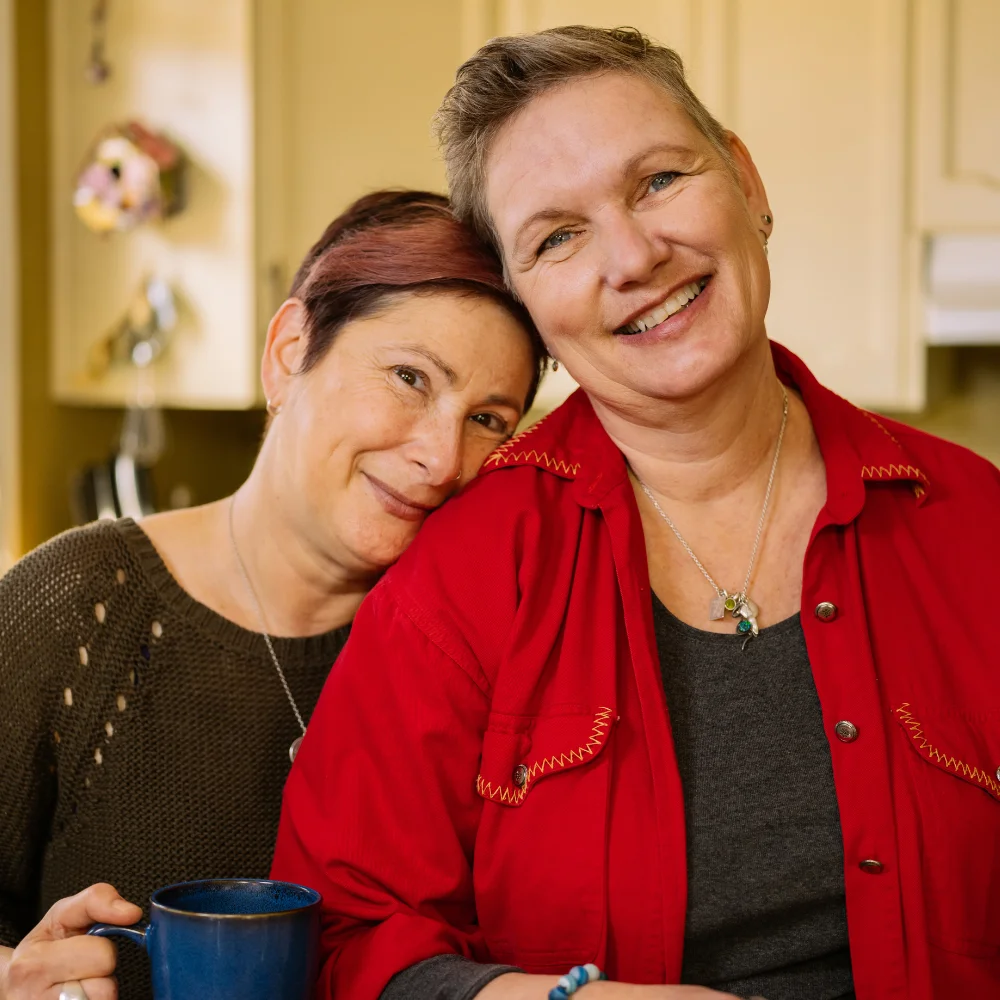Are you LGBTQ+ and a caregiver?
Here are some tips for helping you cope with caregiving taking into account your life path, gender identity and/or sexual orientation.

Dignity, solidarity, well-treatment, equality. In your life journey and your path in terms of gender identity and/or sexual orientation, you have certainly sought to make these words your reality. The notions of choice and freedom are important.
These same notions appear in the National policy for caregivers. This policy specifies that caregiving must be freely chosen, informed and revocable. Does this surprise you? Do these words ring a bell?
Caregiving sometimes has an impact on day-to-day life (at work or in social relationships, for example). The law stipulates:
(…) it is essential for caregivers to recognize themselves and be recognized in the diversity of the realities they experience, of their life paths and of the contexts in which they assume their role.
The caregiver is a person. With their own reality, values, choices and life path.
At this point in your life when you’re a caregiver, certain aspects surface, or resurface.
These testimonials show the variety of caregivers’ journeys. What difficulties, responsibilities, challenges or joys do you have in common with these people? Do you recognize yourself as a caregiver? What would your story be? How would you express yourself?
Practical tools
Programs
Measures
Free training programs
Organizations
Support and self-help groups
At work, my colleagues know that I’ve been in a relationship with a man for years, but they don’t understand why I’ve been taking time off to look after him since he was diagnosed with multiple sclerosis. What can I do?
Your colleagues may find it difficult to understand what caregiving is, and you may too! Here are some practical tips to help you balancing work and caring, find out about short-term absences, employment insurance and compassionate care benefits, and learn about labour standards and leave for caregivers. With your partner’s situation, you need compassion more than ever.
I’m gay “and” a caregiver “and” a senior. Is this a triple whammy?
We might even add: “and” a man! It’s certainly not easy to combine these realities. Aware of this issue, Fondation Émergence drew up the Charter for the fair treatment of LGBT seniors, which l’Appui pour les proches aidants signed in 2019. When you contact our Caregiver Support Helpline or take a free online training, you’re assured of a homophobia- and transphobia-free environment. In fact, the Avec toi sous un autre toit training course could be just what you need.
My support for a long-time friend is limited to doing his shopping once a week and helping him pay his bills at the beginning of each month. Am I a caregiver?
The law states that support can be occasional or continuous, short- or long-term, and that it is not necessary to be connected by family or marital ties, or even to live with the person being cared for. A recent survey shows that 50% of caregivers provide less than 5 hours of support per week, and that 14% of caregivers are not related to the person being cared for. This diagram drawn up by Fondation Émergence and this short checklist will help you clarify the answer to your question.
I’ve heard it said that in LGBTQ+ communities, very few people self-identify as a caregiver. Is this true? Which raises another question: what’s the point in recognizing oneself as a caregiver?
Julien Rougerie, in charge of the seniors and caregivers’ programs at Fondation Émergence, explains that being LGBTQ+ and not self-identifying as a caregiver represents a greater risk of burnout and increased difficulty in accessing available health and social services.
Over the years, my partner and I have “filtered” our entourage a lot. With her progressive illness, we need help at home, but she doesn’t like the idea of someone coming into the house. How can we convince her?
It’s not uncommon for the person you care for to refuse outside services. In LGBTQ+ communities, this reaction may be even more frequent, due to fear of prejudice. We suggest that you and your partner find out about home care assistance and other services that could meet your needs, and discuss them together. A resource directory is available to help you search by postal code and/or type of service. You can also speak to a Caregiver Support counselor by phone, e-mail or live chat.
Annual Review of Sociology. Expanding Notions of LGBTQ+.
Fondation Émergence. Assurer la bientraitance des personnes aînées lesbiennes, gaies, bisexuelles et trans.
Gouvernement du Québec. Sexual diversity and gender pluralism.
Gouvernement du Québec. Reconnaître pour mieux soutenir. Plan d'action gouvernemental pour les personnes proches aidantes 2021-2026.
Gouvernement du Québec. Informal and family caregiver.
Fondation Émergence and Université de Sherbrooke. La proche aidance dans les populations 2SLGBTQ+ : État des lieux.
L'Appui pour les proches aidants. Épisode 3 - Alzheimer et troubles neurocognitifs. Des histoires qui résonnent (Saison 3).
L'Appui pour les proches aidants. Être LGBTQ+ et personne proche aidante : un enjeu particulier.
L'Appui pour les proches aidants. Recognize Caregivers in the LGBT community.
L'Appui pour les proches aidants. Putting an End to Caregiver Mistreatment.
Need to talk?
Contact our Caregiver Support Helpline for counselling, information and referrals.
Every day from 8 a.m. to 8 p.m.
Free of charge.